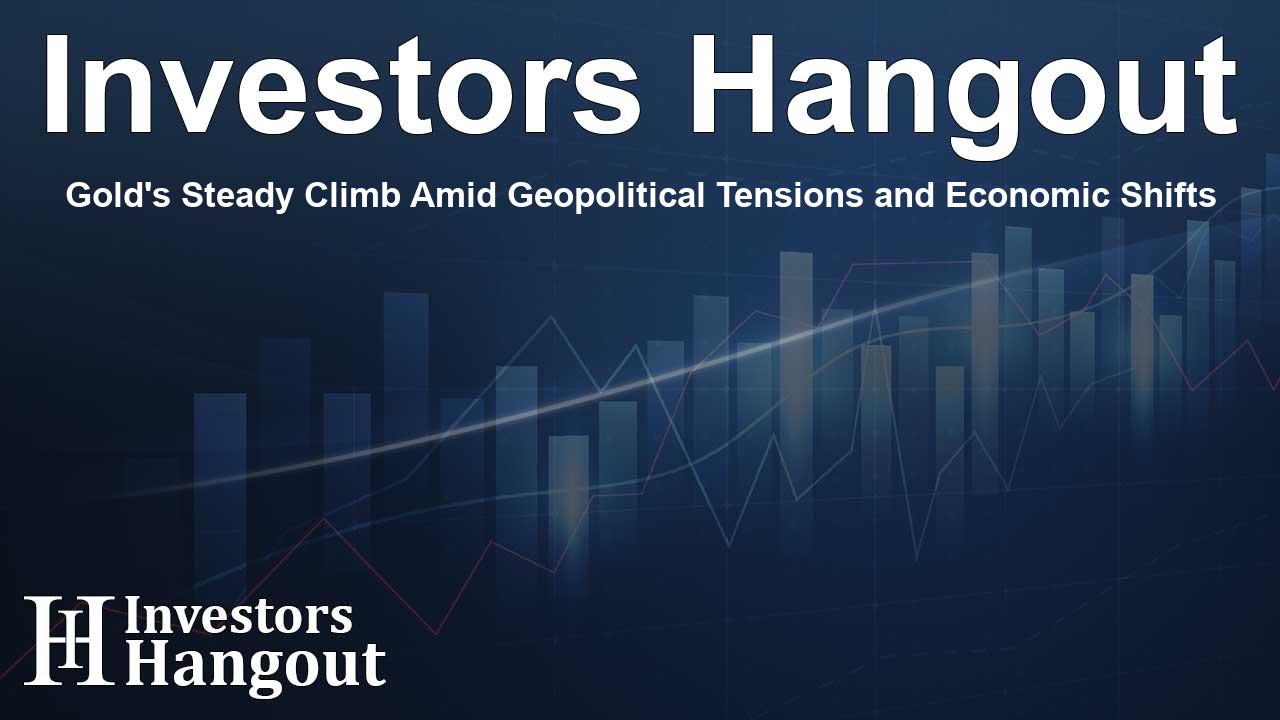Gold's Steady Climb Amid Geopolitical Tensions and Economic Shifts

Gold Rises for Third Consecutive Session
Gold (XAU/USD) has shown a steady increase of over 0.32%, reflecting a notable rise in safe-haven demand driven by global trade tensions. Investors remain concerned about the stability of global supply chains, making gold a popular choice during times of uncertainty.
The yellow metal typically shines as a safe-haven asset when market volatility escalates. In light of ongoing concerns, XAU/USD’s performance has been strengthened, reaffirming the metal’s pivotal role during economic instability.
The current climate of uncertainty has been exacerbated by remarks from U.S. authorities regarding tariffs. A substantial tariff of 35% on Canadian imports, along with proposed tariffs ranging from 15% to 20% on other trading partners, has intensified worries regarding international trade relations.
Additionally, earlier threats directed towards Brazil and proposed measures impacting various sectors including semiconductors have increased apprehension surrounding global industrial demand and growth trajectories. Trump’s call for a substantial rate cut has also sparked speculation about a dovish shift from the Federal Reserve, further allowing gold to shine as a constrained currency.
The recent Initial Jobless Claims data highlighted unexpected resilience in the labor market, yet market sentiment is still pricing in two prospective rate cuts by year’s end. The balance of economic indicators is keeping the Fed's policy direction closely watched, particularly as signals may affect inflation expectations and gold pricing.
Euro Closes Week With Decline
The euro (EUR/USD) faced a decline, approaching levels of 1.16700, indicating an almost 1% loss for the week. This drop is largely attributed to market adjustments amidst a backdrop of growing trade tensions and fluctuating monetary policy perspectives.
Following the announcement of tariffs by U.S. officials, the euro experienced downward pressure as investors reacted to the shifting regulatory landscape. The impacts from tariffs on both Canadian imports and Brazilian goods have heightened market concerns, leading to a cautious investor attitude.
Moreover, discussions within the Federal Reserve revealed a conflicting stance on rate cuts amid fiscal pressures. Fed officials are weighing inflation risks alongside forecasts of economic growth, causing additional ambiguity surrounding future monetary policy.
The strength of the U.S. dollar (USD) against the euro was further compounded by risk aversion among investors, signifying a robust shift in market dynamics ahead of forthcoming economic indicators.
Bitcoin Sets a New High of $116,000
In the cryptocurrency world, Bitcoin has surged to a remarkable high of $116,000 within a short span following significant fiscal developments. This bump showcases the growing appeal of digital assets as investors gravitate towards alternatives amidst changing economic narratives.
The surge of 6% following major fiscal legislation indicates Bitcoin's continued evolution as a valuable asset. Institutional interest has bolstered Bitcoin's demand as financial dynamics shift, marking a new chapter for the cryptocurrency market.
The recent legislative changes contributing to increased U.S. national debt further solidify investor fears of inflation, leading to bullish sentiment surrounding Bitcoin and precious metals like gold.
Despite a temporary pause in BTC/USD’s rally during certain trading sessions, analysts anticipate ongoing traction within the established trend. Institutional investment plays a significant role in Bitcoin’s rapid growth, evidenced by notable funds such as BlackRock's Bitcoin ETF, which has seen impressive growth in assets.
Frequently Asked Questions
What factors are contributing to the rise in gold prices?
The rise in gold prices is primarily driven by geopolitical tensions, tariff announcements, and speculation about upcoming rate cuts by the Federal Reserve, making gold a preferable safe-haven asset for investors.
How has the U.S. dollar affected the euro?
The U.S. dollar has strengthened significantly against the euro, mainly due to escalated trade tensions and differing monetary policy expectations, leading to a near 1% weekly loss for the euro.
What recent developments have influenced Bitcoin's price?
Major fiscal changes and growing institutional investment have driven Bitcoin's price upward, culminating in a record high as investors look for alternatives amidst economic uncertainty.
Why is gold considered a safe haven?
Gold is considered a safe-haven asset due to its intrinsic value and historical reliability during economic downturns or periods of volatility, making it a preferred choice for many investors.
How might future Federal Reserve policies impact gold?
Potential dovish shifts in Federal Reserve policies, particularly regarding rate cuts, may enhance gold’s appeal as a hedge against inflation and currency depreciation, impacting demand and prices positively.
About The Author
Contact Henry Turner privately here. Or send an email with ATTN: Henry Turner as the subject to contact@investorshangout.com.
About Investors Hangout
Investors Hangout is a leading online stock forum for financial discussion and learning, offering a wide range of free tools and resources. It draws in traders of all levels, who exchange market knowledge, investigate trading tactics, and keep an eye on industry developments in real time. Featuring financial articles, stock message boards, quotes, charts, company profiles, and live news updates. Through cooperative learning and a wealth of informational resources, it helps users from novices creating their first portfolios to experts honing their techniques. Join Investors Hangout today: https://investorshangout.com/
The content of this article is based on factual, publicly available information and does not represent legal, financial, or investment advice. Investors Hangout does not offer financial advice, and the author is not a licensed financial advisor. Consult a qualified advisor before making any financial or investment decisions based on this article. This article should not be considered advice to purchase, sell, or hold any securities or other investments. If any of the material provided here is inaccurate, please contact us for corrections.
